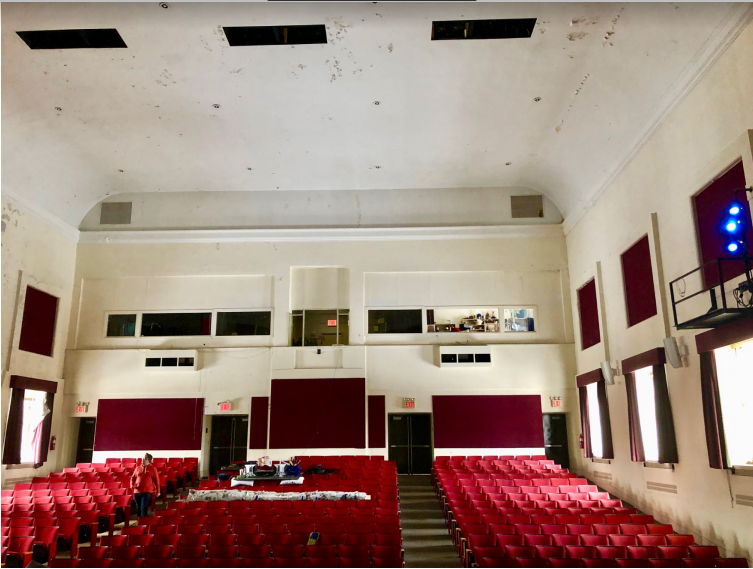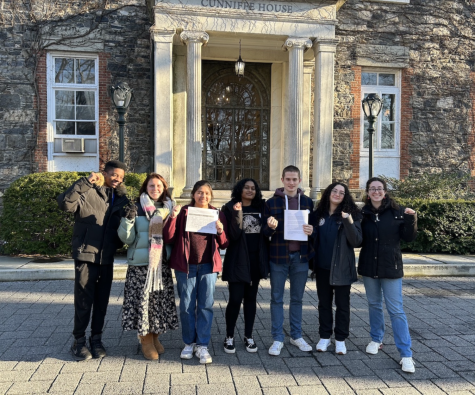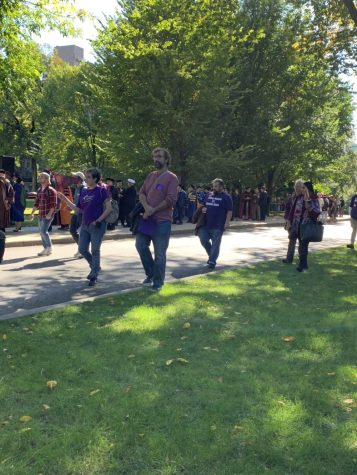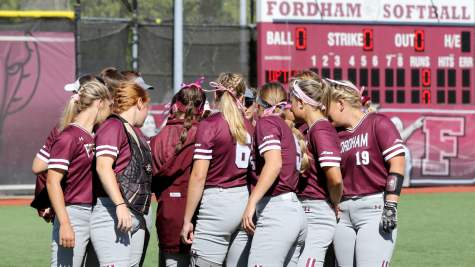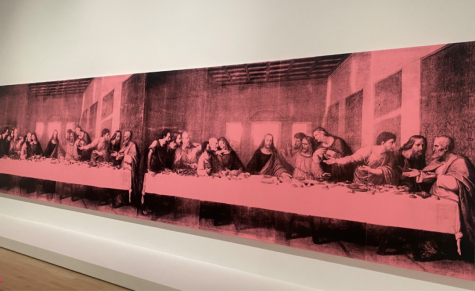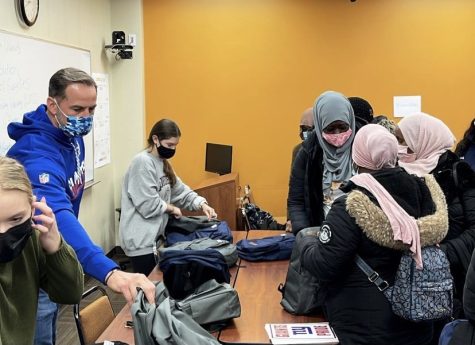USG and Fordham Theatrical Groups Request Repairs to Collins Hall Theater
By Eliot Schiaparelli
Fordham United Student Government (USG), in conjunction with The Mimes and Mummers, Theatrical Outreach Program (TOP) and Fordham Experimental Theater (FET), has put out a report on the state of Collins Hall requesting repairs to the theater space.
The statement, titled “Student Voices for Future Maintenance of a Beloved Space,” lists testimony from each group that uses the space, as well as from individual students and alumni.
Collins Hall, which is home to Fordham’s theater and philosophy departments, has been a contentious issue for students over the past several years. The Ram reported in April 2018 that Fordham Facilities Management planned to make Collins Hall wheelchair accessible by replacing one of the building’s staircases with an elevator.
They said the project would be finished by the end of 2018, but as of February 2019 it still has not begun. USG also made statements about accessibility in Collins Hall in 2013 and 2015.
Marco Valera, vice president for Facilities Management explained the work delay. “We received funding for the project in July 2018 as per our annual budget cycle, although we were looking to start the work in 2018 the design was not completed till the fall as we encountered some challenges with the building’s structure, therefore we moved the start of construction to this year, as the demolition for this project is very intrusive and noisy to the building,” Valera said. “This project is a priority, the budget is $4 million.”
Stephen Clarke is the assistant director for campus center operations. “Work on installing an elevator in Collins Hall is expected to begin shortly after commencement,” Clarke said. “Much of the major construction will take place over the summer months in an effort to reduce the impact on students using Collins auditorium in the fall.”
Collins is one of the oldest buildings on campus. Collins Hall would violate The Americans with Disabilities Act of 1990 (ADA), a document that makes it illegal for buildings to be inaccessible to disabled people. However, it was built in 1904 and therefore escapes those regulations.
Students from the various clubs and organizations who put together the petition presented it at this month’s Student Life Council (SLC) meeting. SLC is made up of student representatives from RHA, CAB, CSA and USG as well as department heads from Residential Life, the Office of Student Involvement, Fordham College at Rose Hill, Gabelli School of Business and the Dean of Students.
Ashley Qamar, FCRH ’20, USG vice president of Student Life, created the statement. She said it was important for students to present at SLC because the statement was a matter of public concern, and students needed to voice their concerns in front of administrators. She said the statement was a call to action and a request for help from the university.
“Overall, what I’m asking for is that the burden be taken off the students and for them to have a space where they can work and not feel responsible for taking care of it on their own,” she said.
Qamar helped draft USG’s testimony in the statement. “We, however, acknowledge that maintenance for the auditorium is difficult and costly,” it read. “With the installation of an elevator over the summer, it is our hope that these needed repairs can now occur. With the construction of the elevator, resources will be brought into the building which could potentially be used to maintain the student programming space.”
USG requested that renovations be made, such as replacing the main stage curtain, repainting the theater, repairing cracks in the walls and ceilings, improving ventilation, replacing seats in the theater, renovating the floor and improving seating the smaller Blackbox theater.
Qamar has been drafting and putting together the statement since October 2018. She said that she feels it is important to make a statement showing students’ devotion to the space to administrators.
“The bigger emphasis is that Collins is such an important student programming space,” she said. “I thought it was really important that the statement be written because a lot of administrators, faculty and staff members who work for the university are looking at the space in the daylight, and Collins doesn’t come alive until the night when TOP, FET and the Mimes finish their classes and go there.”
The Mimes and Mummers executive board also contributed testimony to the statement. They wrote about how hard they work to create professional productions and how they want a space that lives up to the same standards to which they hold themselves.
“We hire professional directors to help us reach our goal; directors who expect a certain standard out of any place they are employed, and we are determined to meet that standard,” they wrote. “Collins Auditorium has given so much to the students who work in it. The space as well as the students deserves attention from the University so that our club can meet its fullest potential.”
An account of the space from TOP’s executive board spoke highly of the space and of their experiences with it but also recognized the drawbacks of it.
“Several of our productions, especially those held during the winter months, have been impacted by the building’s inability to properly heat the auditorium,” they wrote. “The space’s sound system often provides an added challenge to our productions, and the paint chips that often litter the seats draw frequent comments from our audience members.”
The executive board of FET contributed a description of their problems with Collin’s smaller theater that they utilize, the Blackbox theater. They wrote about practicing in winter coats due to heating problems.
“With a minor facelift, the Blackbox and Collins Hall could continue to serve Fordham students for years to come,” they wrote. “Collins Hall is rich with memories, friendships and years of entertainment, and we’d love to do anything we can to preserve the integrity of the space while improving its functionality.”
Clarke said some of the repairs may be able to begin immediately, while others will have to wait for the installation of the elevator.
“Currently, Campus Center Operations and Facilities are working on the elevator project for Collins Auditorium. We are also moving forward on repairs to the light system in the Blackbox Theater,” Clarke said. “Once construction of the elevator is completed, discussion of other potential projects will begin.”





































































































































































































